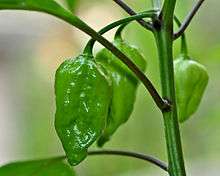Naga Morich
The Naga chili, locally known as Naga Mircha, is a chili pepper cultivated in Northeast India and Bangladesh. It is one of the hottest known chilli peppers, and is closely related to the Bhut jolokia.
| Naga Chili | |
|---|---|
 | |
| Species | Capsicum chinense × Capsicum frutescens[1] |
| Origin | Northeast India Bangladesh |
| Heat | |
| Scoville scale | 1,000,000[2] – 1,598,227[3] SHU |
Plant characteristics
Like many varieties of the Capsicum chinense species, the Naga chili is a small to medium shrub with large leaves, small, five-petaled flowers, and hot fruit. It has a wrinkled texture as opposed to the smoother flesh of similar varieties.
Distribution
The plants are cultivated in Bangladesh, North East India, especially in Nagaland and Manipur, thus the origin of the name "Naga". They are also grown in the United States, United Kingdom (as subspecies Dorset Naga) and Australia for the production of hot sauces, and in Finland, where it is mainly sold fresh in supermarkets. It is also available in West Africa.
Culinary usage
The Naga chili is hot. Many specialists say that the Naga chili has a sweet and slightly tart flavor, followed by slight undertones of woody, smoky flavors. The chili is traditionally used green by the Bangladeshis, often eaten raw as a side dish, or in pickled form as a relish with rice and curry.
Dorset Naga
The Dorset Naga is a substrain of the original Naga Morich from Bangladesh.[3] Since 2005, the heat level of Dorset Naga ranged from 661,451 SHUs for green fruit in 2007, up to 1,032,310 SHUs for ripe fruit harvested in 2009.[4] The BBC's Gardeners' World television programme recorded a much higher heat level for Dorset Naga. As part of 2006 programming, the BBC gardening team ran a trial looking at several chili varieties, including Dorset Naga. Heat levels were tested by Warwick HRI, and the Dorset Naga came in at 1,598,227 SHUs, one of the hottest heat levels recorded at that time for a chili.[3][5]
See also
- Bhut jolokia
- Naga Viper pepper
- Scoville scale, a measurement of the pungency ("spicy heat") of a chili pepper.
- Pungency
- Race to grow the hottest pepper
References
- Lim, T. K. (2013). Edible Medicinal and Non-Medicinal Plants: Volume 6, Fruits. Springer. p. 205. ISBN 9789400756274.
- "The Scoville Scale". Pepper Information. Chilipepper.com. Archived from the original on 21 July 2012. Retrieved 8 May 2011.
- "Some Like It Hot: Dorset's Ultra-Hot Chillies". Archived from the original on 19 November 2012. Retrieved 25 August 2010.
- "Dorset Naga". Dorset Naga. Retrieved 2012-07-20.
- "Gardening: 20 October 2006". bbc.co.uk. London: BBC. 20 October 2006. Gardeners' World's hottest chillies. Archived from the original on 17 January 2008. Retrieved 20 July 2012.